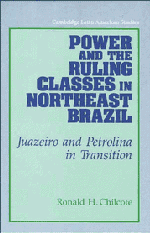Book contents
- Frontmatter
- Contents
- List of tables and figures
- Preface
- PART I THE TRADITIONAL SERTÃO
- 1 The background
- 2 The structure of power and the ruling class
- 3 Juazeiro: cohesion and factionalism
- 4 Petrolina: patriarchy and family dominance
- 5 The ruling class and the polity
- 6 The ruling class and the economy
- 7 The ruling class in civic and social life
- 8 Ideology
- 9 Development and underdevelopment
- 10 Participation, mobilization, and conflict
- PART II THE SERTÃO REVISITED
- Appendix
- Bibliography
- Index
- CAMBRIDGE LATIN AMERICAN STUDIES
7 - The ruling class in civic and social life
from PART I - THE TRADITIONAL SERTÃO
Published online by Cambridge University Press: 30 September 2009
- Frontmatter
- Contents
- List of tables and figures
- Preface
- PART I THE TRADITIONAL SERTÃO
- 1 The background
- 2 The structure of power and the ruling class
- 3 Juazeiro: cohesion and factionalism
- 4 Petrolina: patriarchy and family dominance
- 5 The ruling class and the polity
- 6 The ruling class and the economy
- 7 The ruling class in civic and social life
- 8 Ideology
- 9 Development and underdevelopment
- 10 Participation, mobilization, and conflict
- PART II THE SERTÃO REVISITED
- Appendix
- Bibliography
- Index
- CAMBRIDGE LATIN AMERICAN STUDIES
Summary
Statistical data relating to civic and social life today are readily available to the traveler who reaches Juazeiro and Petrolina. In the past an occasional report revealed such information. For example, one could learn that in 1939 in Juazeiro there were 350 people affiliated with labor unions and another 300 with other organizations. A generation later, census data for Petrolina revealed 825 members of sporting clubs, 625 members of social clubs, and 178 members of an artisan union. Military rule of Brazil was characteristic of both periods, and clearly institutional life had become more complex in the interim. Whereas the organization and manipulation of the working classes had been an objective of legislation under Getúlio Vargas during the 1930s, military intervention into unions had resulted in their ineffectiveness or demise by the 1960s and 1970s. It was more appropriate for a worker to belong to a soccer club than to a union, and this was dictated not only by general conditions in Brazil, but by the behavior of the ruling classes in Juazeiro and Petrolina.
When the panels of the initial phase of my study were asked to name the ten most important organizations in their communities, choices for Juazeiro focused on fraternal organizations – the Rotary Club, Lions Club, and the Freemasons' lodges – and then on social clubs and a cooperative of artisans.
- Type
- Chapter
- Information
- Power and the Ruling Classes in Northeast BrazilJuazeiro and Petrolina in Transition, pp. 177 - 198Publisher: Cambridge University PressPrint publication year: 1990



